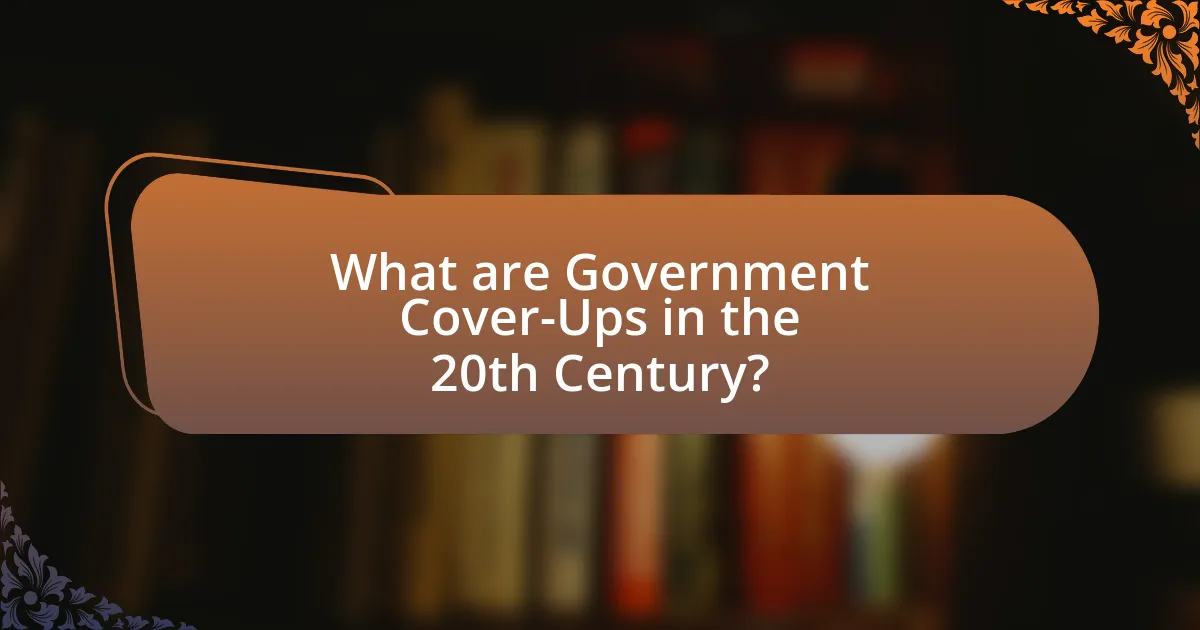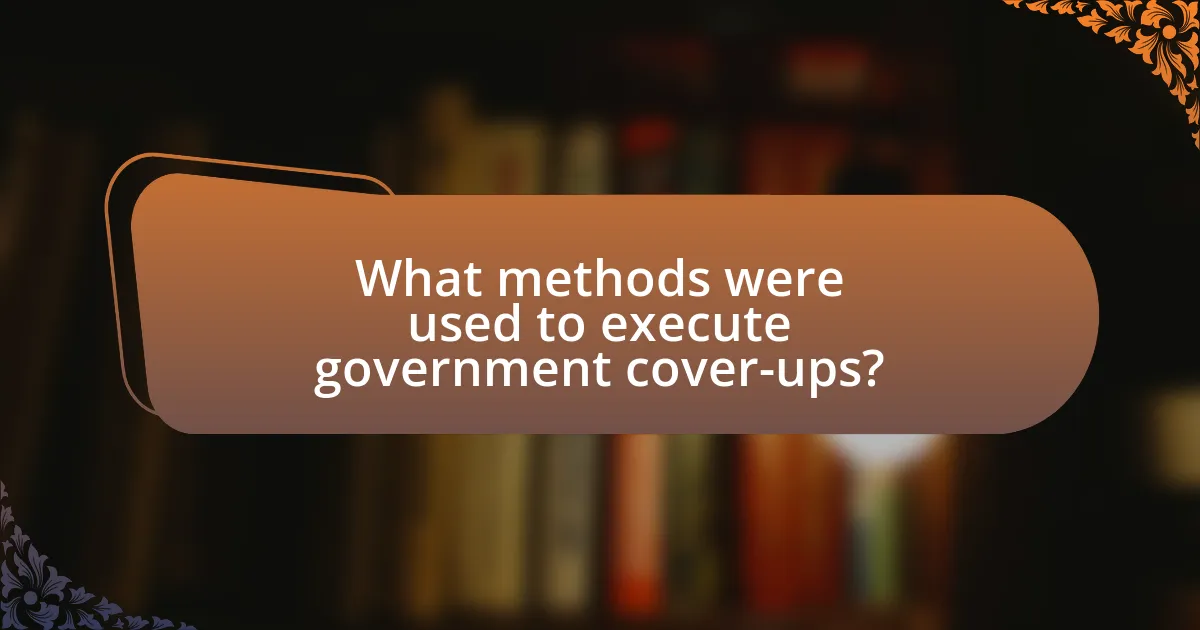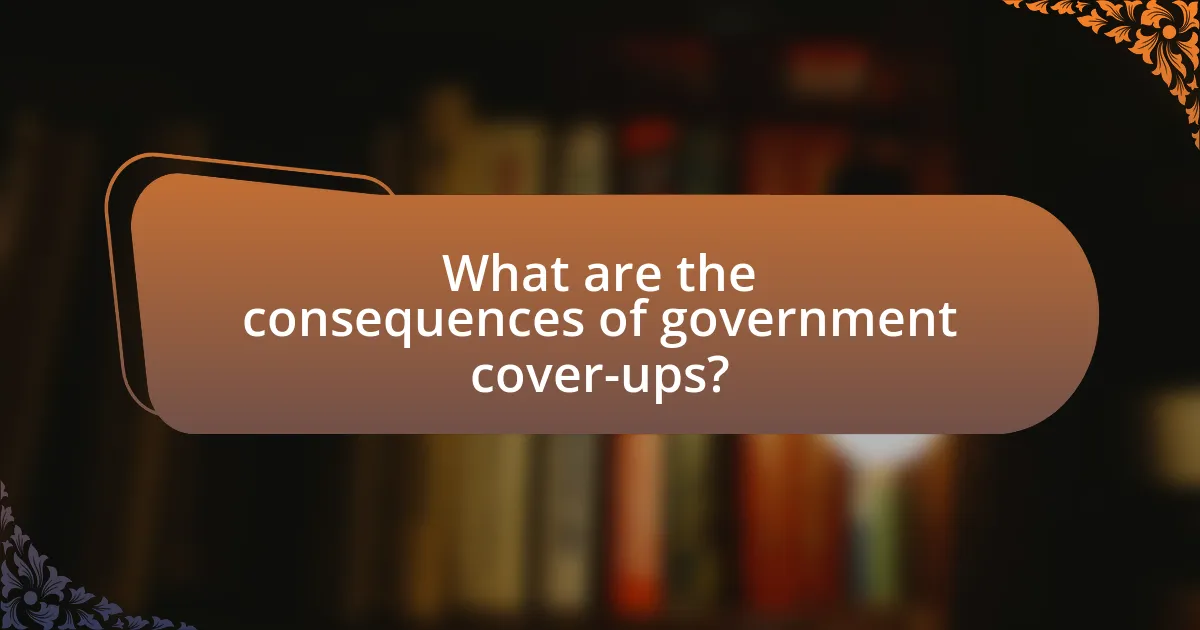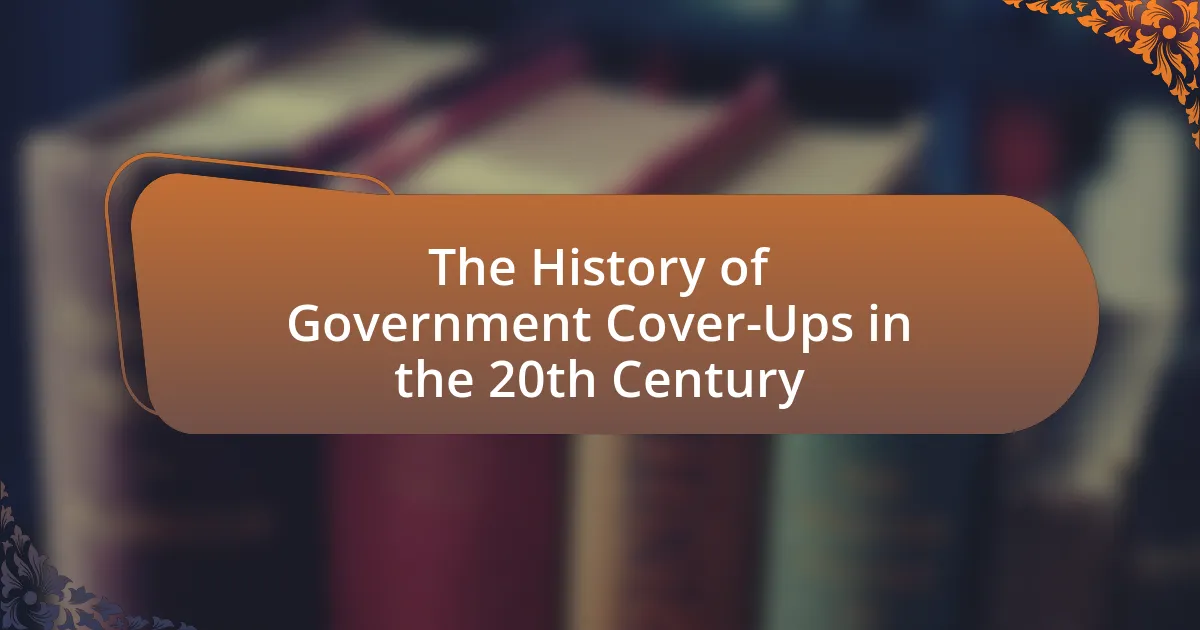The article examines government cover-ups in the 20th century, highlighting deliberate efforts by state authorities to conceal significant events and scandals from the public. Key examples include the Watergate scandal, the Tuskegee Syphilis Study, and the Iran-Contra affair, which illustrate how governments prioritized their interests over transparency. The article discusses the emergence of these cover-ups, their impact on public trust, and the methods used to manipulate information. Additionally, it explores the legal frameworks that supported these actions and the long-term consequences for democratic processes and voter behavior. Ultimately, the article emphasizes the importance of transparency and accountability in governance.

What are Government Cover-Ups in the 20th Century?
Government cover-ups in the 20th century refer to deliberate efforts by state authorities to conceal information or actions from the public, often involving significant events or scandals. Notable examples include the Watergate scandal in the 1970s, where the Nixon administration attempted to cover up its involvement in a break-in at the Democratic National Committee headquarters, leading to President Nixon’s resignation. Another example is the Tuskegee Syphilis Study, which lasted from 1932 to 1972, where the U.S. Public Health Service misled African American men about their syphilis treatment, resulting in long-term health consequences. These instances illustrate how governments have historically engaged in cover-ups to protect their interests or maintain public order, often at the expense of transparency and ethical standards.
How did government cover-ups emerge during this period?
Government cover-ups emerged during the 20th century primarily as a response to political scandals, military failures, and public unrest. For instance, the Watergate scandal in the early 1970s exemplified how government officials sought to conceal illegal activities, leading to a significant erosion of public trust. Additionally, the Pentagon Papers revealed the U.S. government’s misleading information regarding the Vietnam War, further illustrating the tendency to suppress information to maintain control over public perception. These instances highlight a pattern where governments prioritized their image and stability over transparency, often resulting in widespread consequences when the truth was eventually uncovered.
What historical events triggered significant cover-ups?
Significant cover-ups in history were triggered by events such as the Watergate scandal, the Iran-Contra affair, and the Gulf of Tonkin incident. The Watergate scandal, which involved a break-in at the Democratic National Committee headquarters in 1972, led to a cover-up by President Nixon’s administration, ultimately resulting in Nixon’s resignation in 1974. The Iran-Contra affair, occurring in the 1980s, involved secret U.S. arms sales to Iran and the diversion of funds to Contra rebels in Nicaragua, prompting extensive investigations and revelations of government misconduct. The Gulf of Tonkin incident in 1964, where U.S. naval vessels were allegedly attacked by North Vietnamese forces, was later revealed to have been misrepresented, leading to escalated U.S. involvement in Vietnam and subsequent cover-ups regarding the true nature of the events. These instances exemplify how governmental actions often led to significant efforts to conceal the truth from the public.
How did public perception of government change due to these cover-ups?
Public perception of government significantly deteriorated due to these cover-ups, leading to widespread distrust among citizens. Events such as the Watergate scandal and the Iran-Contra affair revealed a pattern of deception and lack of transparency, causing the public to question the integrity and accountability of government officials. According to a Gallup poll conducted in 1974, trust in government plummeted to 36%, a stark contrast to the 77% recorded in 1964, illustrating the profound impact of these revelations on public sentiment. This decline in trust has persisted, influencing political engagement and skepticism towards government actions in subsequent decades.
Why are government cover-ups significant in understanding history?
Government cover-ups are significant in understanding history because they reveal the complexities of power dynamics and the manipulation of information by authorities. These cover-ups often indicate the lengths to which governments will go to protect their interests, as seen in events like the Watergate scandal, where the Nixon administration attempted to conceal its involvement in a break-in at the Democratic National Committee headquarters. Such actions not only shape public perception but also influence political accountability and trust in institutions. Historical analysis of cover-ups, like the Pentagon Papers, demonstrates how suppressed information can alter the course of public opinion and policy, highlighting the importance of transparency in governance.
What impact did these cover-ups have on public trust?
Cover-ups significantly eroded public trust in government institutions. Historical instances, such as the Watergate scandal in the 1970s, demonstrated that government officials could engage in deceitful practices, leading to widespread skepticism about the integrity of political leaders. According to a Gallup poll conducted in 1974, public confidence in the presidency dropped to 36% following the revelations of the scandal, illustrating a direct correlation between cover-ups and diminished trust. This pattern has been observed in various other incidents, such as the Iran-Contra affair, where the concealment of actions led to further disillusionment among citizens regarding governmental transparency and accountability.
How do cover-ups shape political narratives?
Cover-ups shape political narratives by obscuring the truth and manipulating public perception. When governments engage in cover-ups, they often create alternative narratives that serve to protect their interests, maintain power, or divert attention from scandals. For instance, the Watergate scandal in the 1970s involved a cover-up by the Nixon administration, which ultimately led to a significant shift in public trust towards government institutions. This event illustrates how cover-ups can lead to a loss of credibility and foster skepticism among citizens, thereby reshaping the political landscape. Additionally, the Iran-Contra affair demonstrated how concealment of actions can alter the narrative surrounding foreign policy and executive authority, impacting public opinion and legislative oversight.
What are some notable examples of government cover-ups in the 20th century?
Notable examples of government cover-ups in the 20th century include the Watergate scandal, the Tuskegee syphilis study, and the Iran-Contra affair. The Watergate scandal involved a break-in at the Democratic National Committee headquarters and subsequent efforts by the Nixon administration to conceal its involvement, leading to President Nixon’s resignation in 1974. The Tuskegee syphilis study, conducted from 1932 to 1972, involved the unethical treatment of African American men who were misled about their health status and denied treatment for syphilis. The Iran-Contra affair, which occurred during the Reagan administration in the 1980s, involved the secret sale of arms to Iran to fund Contra rebels in Nicaragua, circumventing congressional restrictions. Each of these instances demonstrates significant governmental misconduct and efforts to suppress the truth.
What details surround the Watergate scandal?
The Watergate scandal involved a break-in at the Democratic National Committee headquarters and subsequent cover-up efforts by members of the Nixon administration. The scandal began on June 17, 1972, when five men were arrested for breaking into the Watergate office complex in Washington, D.C. Investigations revealed that the break-in was part of a broader campaign of political espionage and sabotage orchestrated by the Nixon campaign. Key evidence included tape recordings of conversations in the Oval Office, which ultimately led to President Richard Nixon’s resignation on August 8, 1974, making him the first U.S. president to resign from office. The scandal resulted in numerous indictments and convictions of Nixon’s aides and raised significant concerns about government accountability and abuse of power.
How did the Iran-Contra affair exemplify government secrecy?
The Iran-Contra affair exemplified government secrecy through the covert operations conducted by U.S. officials to facilitate arms sales to Iran while simultaneously funding Contra rebels in Nicaragua, circumventing Congress. This operation was characterized by a lack of transparency, as key government figures, including members of the Reagan administration, engaged in secret negotiations and misled Congress about the activities. The affair was revealed in 1986, highlighting the extent of deception and the use of classified information to bypass legal restrictions, ultimately leading to investigations that exposed the government’s disregard for accountability and oversight.

What methods were used to execute government cover-ups?
Government cover-ups were executed through methods such as misinformation, suppression of evidence, and manipulation of public perception. For instance, during the Watergate scandal, the Nixon administration employed tactics like the destruction of documents and the use of covert operations to conceal illegal activities. Additionally, the CIA’s MKUltra program involved the use of mind control experiments without public knowledge, showcasing how agencies can obscure their actions. These methods demonstrate a systematic approach to maintaining secrecy and controlling narratives surrounding controversial events.
How did governments manipulate information during cover-ups?
Governments manipulated information during cover-ups by controlling narratives, censoring media, and disseminating disinformation. For instance, during the Watergate scandal in the 1970s, the Nixon administration attempted to suppress evidence and mislead the public through false statements and selective leaks. Additionally, the Soviet Union’s handling of the Chernobyl disaster in 1986 involved minimizing the incident’s severity and delaying information release to prevent public panic and maintain state credibility. These actions illustrate a systematic approach to obscuring the truth and managing public perception during critical events.
What role did media play in facilitating or exposing cover-ups?
Media played a crucial role in exposing cover-ups by investigating and reporting on government misconduct. Investigative journalism, exemplified by the Watergate scandal coverage by The Washington Post, revealed the extent of political corruption and led to President Nixon’s resignation in 1974. Additionally, media outlets have historically uncovered various cover-ups, such as the Pentagon Papers, which disclosed government deception regarding the Vietnam War, demonstrating the media’s power to hold authorities accountable and inform the public.
How did censorship contribute to the success of cover-ups?
Censorship significantly contributed to the success of cover-ups by suppressing information that could expose wrongdoing. Governments utilized censorship to control narratives, limit public access to critical facts, and prevent dissenting voices from challenging official accounts. For instance, during the Watergate scandal in the 1970s, the Nixon administration employed censorship tactics to restrict media coverage and manipulate public perception, which delayed accountability and allowed the cover-up to persist longer than it might have otherwise. This strategic suppression of information illustrates how censorship can effectively shield government actions from scrutiny, thereby facilitating the success of cover-ups.
What legal frameworks supported government cover-ups?
Legal frameworks that supported government cover-ups include the National Security Act of 1947, which established the legal basis for classifying information as secret to protect national security interests. This act allowed the government to withhold information from the public and Congress, facilitating cover-ups related to military operations and intelligence activities. Additionally, the Freedom of Information Act (FOIA) exemptions, particularly those concerning national defense and foreign policy, have been used to deny access to documents that could reveal government misconduct. Historical instances, such as the Watergate scandal and the Iran-Contra affair, demonstrate how these legal provisions were employed to obscure actions from public scrutiny.
How did national security laws impact transparency?
National security laws significantly reduced transparency by allowing governments to classify information and limit public access to data deemed sensitive. For instance, the U.S. National Security Act of 1947 established a framework for classifying information related to national defense, which led to increased secrecy surrounding government operations. This classification often resulted in the withholding of information from the public and the press, thereby obstructing accountability and oversight. Historical examples include the Pentagon Papers, where the government initially classified documents that revealed misleading information about the Vietnam War, illustrating how national security laws can be used to justify a lack of transparency.
What are the implications of the Freedom of Information Act on cover-ups?
The Freedom of Information Act (FOIA) significantly reduces the potential for government cover-ups by mandating transparency and public access to government records. This legislation, enacted in 1966, allows individuals to request access to federal agency records, thereby promoting accountability and discouraging the concealment of information. For instance, the FOIA has been instrumental in uncovering various government actions, such as the Pentagon Papers, which revealed the U.S. government’s misleading information regarding the Vietnam War. By enabling citizens and journalists to obtain documents, the FOIA serves as a critical tool for exposing misconduct and ensuring that government actions are subject to public scrutiny.

What are the consequences of government cover-ups?
Government cover-ups can lead to a significant erosion of public trust in institutions. When citizens discover that their government has concealed information, it can result in widespread skepticism about the integrity and transparency of governmental actions. For instance, the Watergate scandal in the 1970s revealed extensive cover-ups by the Nixon administration, leading to a loss of faith in political leaders and increased public cynicism towards government. Additionally, cover-ups can hinder accountability, allowing individuals or groups to evade responsibility for their actions, as seen in the case of the Tuskegee Syphilis Study, where the government misled participants about their treatment. Ultimately, these consequences can foster a culture of distrust, impacting civic engagement and the overall health of democracy.
How do cover-ups affect democratic processes?
Cover-ups undermine democratic processes by eroding public trust in government institutions. When governments conceal information or manipulate facts, citizens become skeptical of their leaders and the electoral system, leading to decreased voter engagement and participation. For instance, the Watergate scandal in the 1970s revealed extensive cover-ups by the Nixon administration, which resulted in a significant loss of faith in political leaders and institutions, ultimately contributing to reforms aimed at increasing transparency and accountability in government. Such historical examples illustrate how cover-ups can destabilize the foundational principles of democracy by fostering cynicism and disengagement among the electorate.
What long-term effects do cover-ups have on voter behavior?
Cover-ups significantly erode public trust in government, leading to long-term changes in voter behavior. When citizens perceive that their leaders are dishonest or hiding information, they are more likely to disengage from the political process, resulting in lower voter turnout. For instance, the Watergate scandal in the 1970s caused a decline in trust towards political institutions, which has been linked to decreased participation in elections. Additionally, studies indicate that repeated exposure to cover-ups can foster cynicism among voters, making them more likely to support anti-establishment candidates or movements. This shift in behavior can alter the political landscape, as seen in the rise of populist movements in response to perceived governmental failures.
How do cover-ups influence policy-making?
Cover-ups significantly influence policy-making by obscuring information that could lead to accountability and reform. When governments engage in cover-ups, they often prioritize maintaining power and control over transparency, which can result in policies that ignore public welfare or ethical considerations. For instance, the Watergate scandal in the 1970s led to a series of reforms in campaign finance and government oversight, demonstrating how the exposure of a cover-up can prompt significant policy changes. Conversely, when cover-ups remain undisclosed, they can perpetuate systemic issues, as seen in the Tuskegee Syphilis Study, where the concealment of unethical practices delayed necessary health policies and reforms for decades.
What lessons can be learned from historical government cover-ups?
Historical government cover-ups reveal critical lessons about transparency, accountability, and the importance of public trust. For instance, the Watergate scandal in the 1970s demonstrated that attempts to conceal wrongdoing can lead to significant political consequences, including the resignation of President Richard Nixon. This event highlighted the necessity for checks and balances within government systems to prevent abuse of power. Additionally, the Tuskegee Syphilis Study, which lasted from 1932 to 1972, illustrated the ethical implications of government secrecy, as it involved the exploitation of African American men without their informed consent. These examples underscore the need for ethical governance and the protection of citizens’ rights, emphasizing that transparency fosters trust and accountability in democratic societies.
How can transparency be improved in modern governance?
Transparency in modern governance can be improved through the implementation of open data initiatives, which allow citizens access to government data and decision-making processes. By making information readily available, governments can foster accountability and public trust. For instance, the U.S. government’s Data.gov platform provides access to thousands of datasets, promoting transparency and enabling citizens to engage with their government more effectively. Studies have shown that increased transparency correlates with reduced corruption and enhanced civic participation, as evidenced by the World Bank’s findings on open government data initiatives.
What strategies can citizens employ to hold governments accountable?
Citizens can employ strategies such as voting, advocacy, and utilizing freedom of information laws to hold governments accountable. Voting enables citizens to choose representatives who prioritize transparency and accountability. Advocacy through organized movements or campaigns can raise awareness about government actions and demand accountability. Utilizing freedom of information laws allows citizens to request access to government documents, fostering transparency and enabling scrutiny of government activities. Historical examples, such as the Watergate scandal in the 1970s, illustrate how citizen activism and investigative journalism led to significant government accountability.
What are the best practices for ensuring government accountability?
The best practices for ensuring government accountability include transparency, public participation, and robust oversight mechanisms. Transparency involves making government actions and decisions accessible to the public, which can be achieved through open data initiatives and regular reporting. Public participation allows citizens to engage in the decision-making process, fostering a sense of ownership and responsibility. Robust oversight mechanisms, such as independent audits and legislative review, ensure that government actions are monitored and evaluated for compliance with laws and ethical standards. Historical examples, such as the Watergate scandal, highlight the importance of these practices in uncovering misconduct and restoring public trust in government institutions.
